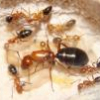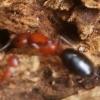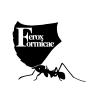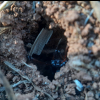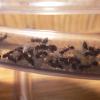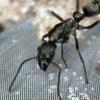Camponotus floridanus
Last time I tried keeping this species, I gave up on them because they grew too fast and ate too much food. This has to be one of the fastest-growing monogynous Camponotus species in the world. They get very large colonies (10,000+) and are extremely aggressive, making it very difficult to feed them if you don't have the proper setup. The major workers are known to draw blood. I will attempt to keep them again and see how far I can get before inevitably needing to release them.
I found this queen in a pool on the morning of June 20, 2019. They have their nuptial flights right after sunset, so she was certainly in there for several hours. After a few days she shed all but one wing and laid her first batch of eggs.


Edited by Aaron567, March 6 2020 - 9:14 PM.

